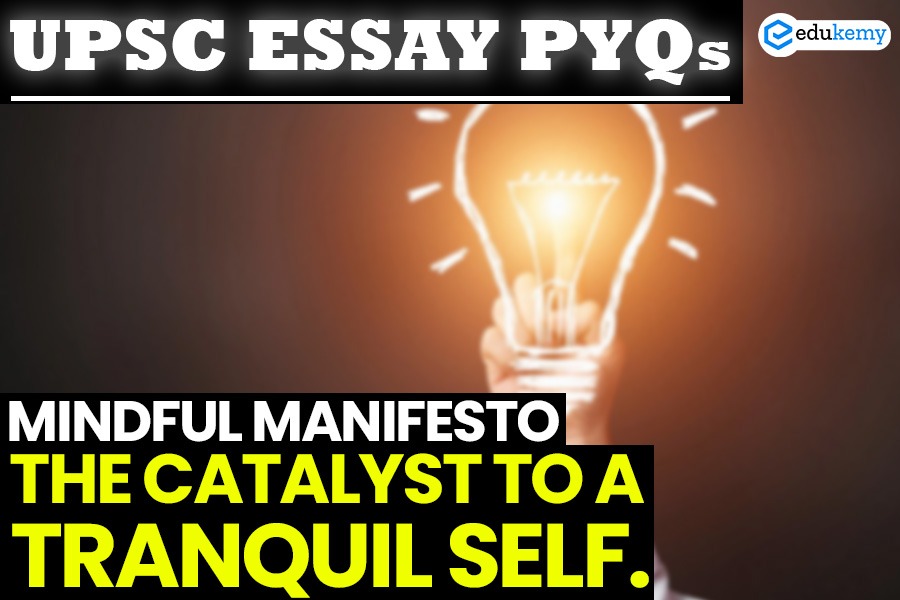1.2K

Explore the power of mindfulness in mental well-being and self-awareness with insights from UPSC essay PYQ 2020.
Contents
Essay Key
| Component | Details |
|---|---|
| Essay Topic | Mindful manifesto is the catalyst to a tranquil self |
| Paraphrase | This essay examines how embracing mindfulness can greatly improve inner peace and overall mental well-being. |
| Intent of the Essay | To examine the core principles of mindfulness and how they practically contribute to attaining a calm and peaceful state of mind. |
| Keywords | mindfulness, tranquility, self-awareness, mental well-being, present moment |
Key Arguments
1. Grasping the Concept of Mindfulness
- Definition: Mindfulness means being fully present in the moment and observing your thoughts and emotions without judging them.
- Historical Background: While it originated in Buddhist teachings, mindfulness is now widely accepted in modern psychology.
- Scientific Support: Research shows that mindfulness helps reduce stress, anxiety, and depression, contributing to better mental health.
2. How Self-Awareness Supports Mindfulness
- Emotional Understanding: Practicing mindfulness builds self-awareness, allowing people to understand their emotions and reactions more clearly.
- Better Choices: With greater self-awareness, individuals tend to make more thoughtful and less impulsive decisions.
- Evidence: Studies reveal that mindfulness enhances emotional control and mental flexibility.
3. Positive Effects on Mental Health
- Less Stress: Mindfulness techniques like meditation lower the stress hormone cortisol, easing stress.
- Sharper Focus: Regular mindfulness practice improves attention span and brain performance.
- Clinical Findings: Many mental health studies have shown major benefits for those who consistently use mindfulness methods.
4. Developing a Mindful Manifesto
- Personal Dedication: A mindful manifesto is a personal plan that helps someone commit to habits that support well-being.
- Simple Practices: It may include things like meditation, daily affirmations, gratitude journaling, and deep breathing.
- Group Support: Being part of a mindfulness group or class can provide extra motivation and accountability.
5. Hurdles to Staying Mindful
- Everyday Distractions: Fast-paced living and digital noise often get in the way of regular mindfulness practice.
- Finding Solutions: Overcoming challenges like time constraints or low motivation is key to staying consistent.
- Long-Term Practice: Adding mindfulness into daily routines helps maintain its benefits in the long run.
Case Studies/Examples
| Case Study | Key Insights | Relevance |
|---|---|---|
| Mindfulness-Based Stress Reduction (MBSR) | MBSR programs have shown significant reductions in anxiety and stress among participants. | Highlights evidence of mindfulness in improving mental health. |
| Jon Kabat-Zinn’s Research | Developed MBSR, demonstrating the effectiveness of mindfulness in clinical settings. | Establishes a scientific basis for mindfulness practice. |
| Corporate Mindfulness Initiatives | Companies implementing mindfulness programs report increased employee well-being and productivity. | Underlines the practical benefits of mindfulness in various domains of life. |

Additional Tips
- Integrate breathing exercises and body scan practices into your daily routine to deepen mindfulness.
- Use mindfulness apps wisely—they can be helpful, but it’s important they don’t become sources of distraction.
- Try incorporating mindful walking or eating into your day as simple ways to stay present, even with a packed schedule.
- Regularly revisit your core values and personal goals to ensure your mindful manifesto reflects your true intentions.

